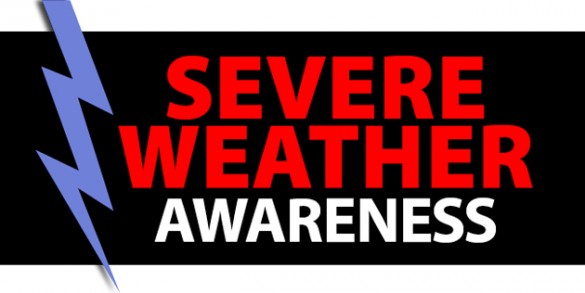 Severe Weather Awareness Week in Tennessee, Feb. 16-22, is a good time to revisit what to do in the event severe weather threatens the Vanderbilt community.
Severe Weather Awareness Week in Tennessee, Feb. 16-22, is a good time to revisit what to do in the event severe weather threatens the Vanderbilt community.
Historically, the spring months—especially March, April and May—are the most active for severe weather throughout the Middle Tennessee area. Tornados can be deadly and occur with little or no warning. In 2013, a total of 36 tornados occurred across Tennessee.
“Our new Emergency Preparedness website is a tremendous resource for the Vanderbilt community. I encourage everyone to review the emergency guides posted there as well as evaluate their individual severe weather plans and procedures,” said Johnny Vanderpool, manager with the Vanderbilt University Police Department’s Emergency Preparedness Unit.
Vanderbilt Severe Weather Warning System
Vanderbilt contracts with a commercial weather monitoring company to warn the university of severe weather approaching Vanderbilt’s main campus and Vanderbilt Health One Hundred Oaks. If a tornado is detected and is within 15 minutes of reaching either campus, the Vanderbilt Severe Weather Warning System is activated.
Electronic sirens on main campus will sound and overhead announcements at Vanderbilt University Medical Center and Vanderbilt Health One Hundred Oaks will notify of the severe weather threat.
The Vanderbilt siren has a distinctive tone, similar to an air raid siren. Click here to listen to a sound sample of Vanderbilt’s electronic sirens. Metropolitan Nashville/Davidson County may also sound its sirens; however, their sirens are not specific to Vanderbilt and are activated when the National Weather Service issues a tornado warning for anywhere in the Davidson County area.
AlertVU
Vanderbilt’s emergency notification system, AlertVU, would also be activated during a severe weather threat. AlertVU is designed to send rapid messages to the delivery points a subscriber chooses—cell phone (voice or text), land line phone or email account – in the event of any type of emergency that poses an imminent threat or danger to the Vanderbilt community. It is available free* to students, faculty and staff. AlertVU automatically sends emergency notifications to all Vanderbilt email addresses; however, subscribers can also register their cell phones, land line phones and personal email addresses to expand the ways in which they receive these important alerts. Information provided by subscribers is private and will not be shared.
To register, update an existing account or find out more, visit Vanderbilt’s Emergency Preparedness website.
*There is no charge to receive AlertVU messages. If you choose to receive text messages, however, your cell phone carrier may charge you to receive them.
Desktop Alerts
The AlertVU desktop alert program was expanded in late 2013 to include more than 6,300 clinical workstations at the medical center. The program will display full-screen desktop alerts on these workstations and on desktops across the university and medical center on which it is installed any time the AlertVU system is activated.
If you are not sure if the desktop alert program has been added to your desktop, have questions or would like to request the service, contact VUIT at 343-HELP.
The desktop alert program operates behind the scenes and has no impact on the day-to-day performance of the computer. When AlertVU is activated, an alert will appear on users’ screens. Users will be asked to acknowledge that they have received the notification and to then take action as directed or resume normal activity. The desktop alert software is available for use on your personal computer while you are using the Vanderbilt network. Downloads are available here. The software should not be downloaded to your office PC unless instructed by your desktop team—that will be handled centrally in most areas.
If you have questions about the program, please email alertvu@vanderbilt.edu.
Tornado warnings: What to Do
When the tornado sirens on campus and the overhead announcements at the Medical Center and One Hundred Oaks sound, you should take the following action:
- Seek shelter inside the closest building.
- Move away from windows, lobbies and doors to the most interior portion of the building or area of best refuge.
- Assist special needs persons.
- Monitor weather reports.
For more information about preparing for severe weather and other types of emergencies, visit the Emergency Preparedness website.